You can find the flyers about the book “The Martial Art of Strategy. Russian Style. 9 Elegant Solutions” at EGC 2008.

You can find the flyers about the book “The Martial Art of Strategy. Russian Style. 9 Elegant Solutions” at EGC 2008.

From the summer beginning till now a big camp for youth is organized near a big beautiful lake named Seliger. More than 4,500 young people from all parts of Russia came there to take part in lectures, trainings and different events on business, politics, regional and social development. This camp has been working every year since 2004.
The Go Federation, the Go and Strategy Club and the Russian School of Go and Strategy took part in this camp to present a new book “The Martial Art of Strategy. Russian Style. 9 Elegant Solutions” (you can find some papers about it at the EGC 2009) and teach young people Go.
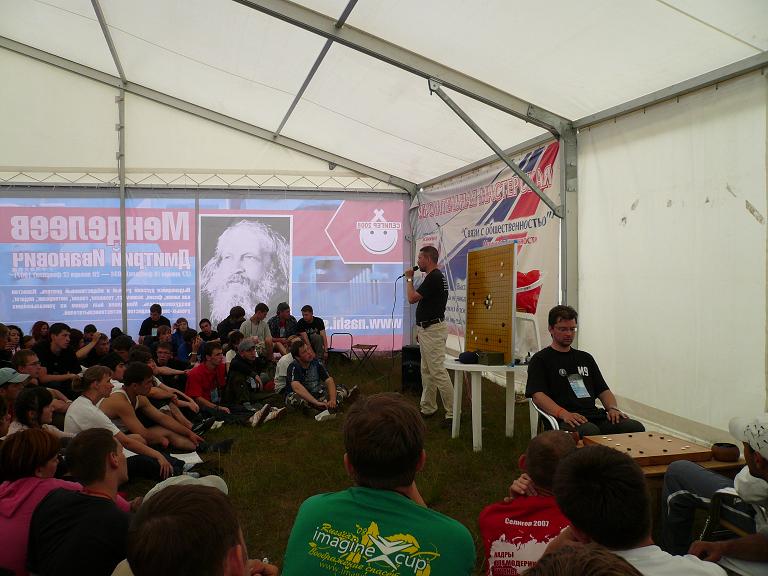
Lecture about Go rules and principles for more than 350 participants. The game is shown on a big board. This time the President of the Go Federation Igor Grishin explains rules and answers questions.
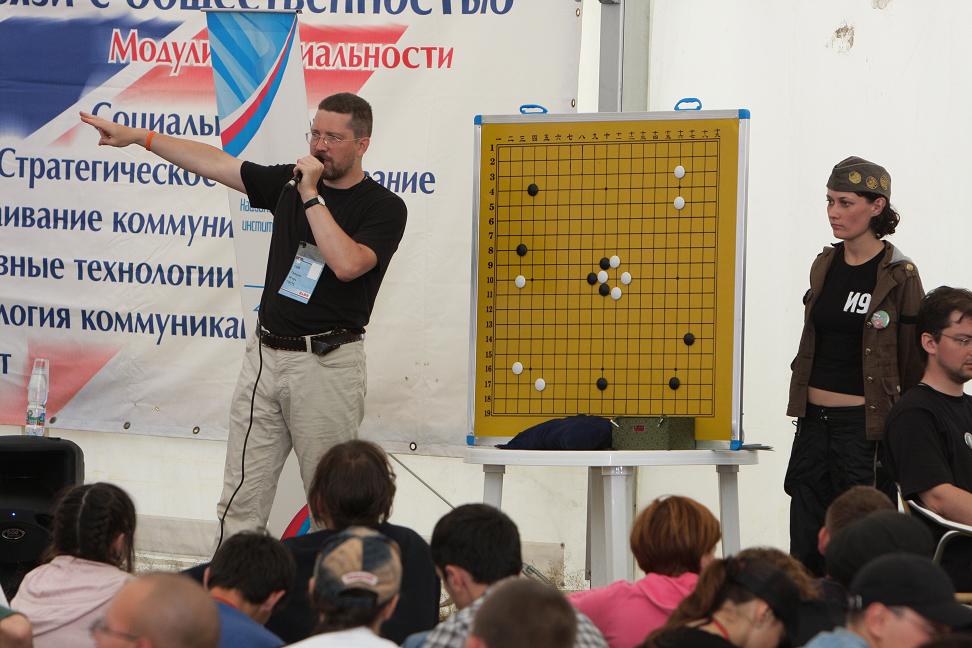
Igor Grishin explains how a player should hold a stone.
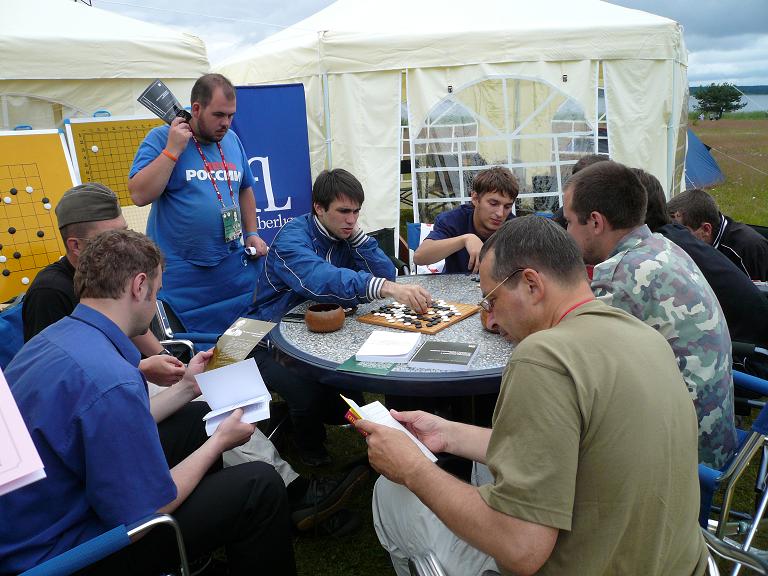
The place for playing Go for all comers in the camp.
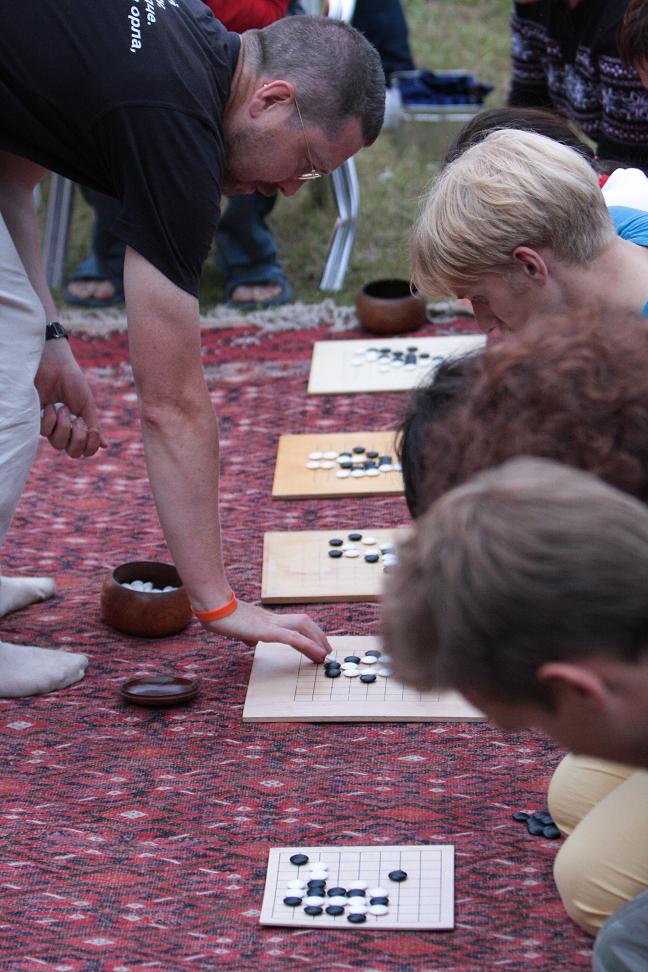
Igor Grishin, Grandmaster of Go&Strategy Club, plays Go with beginners.
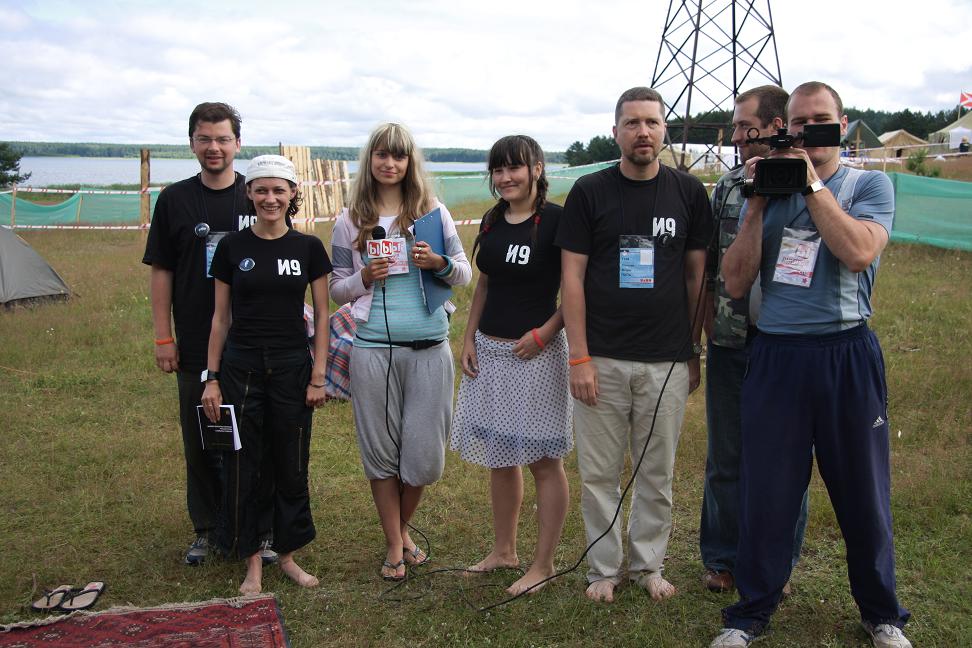
The team from Go-art School “Voskhojdenie” at the Seliger’2008 camp.
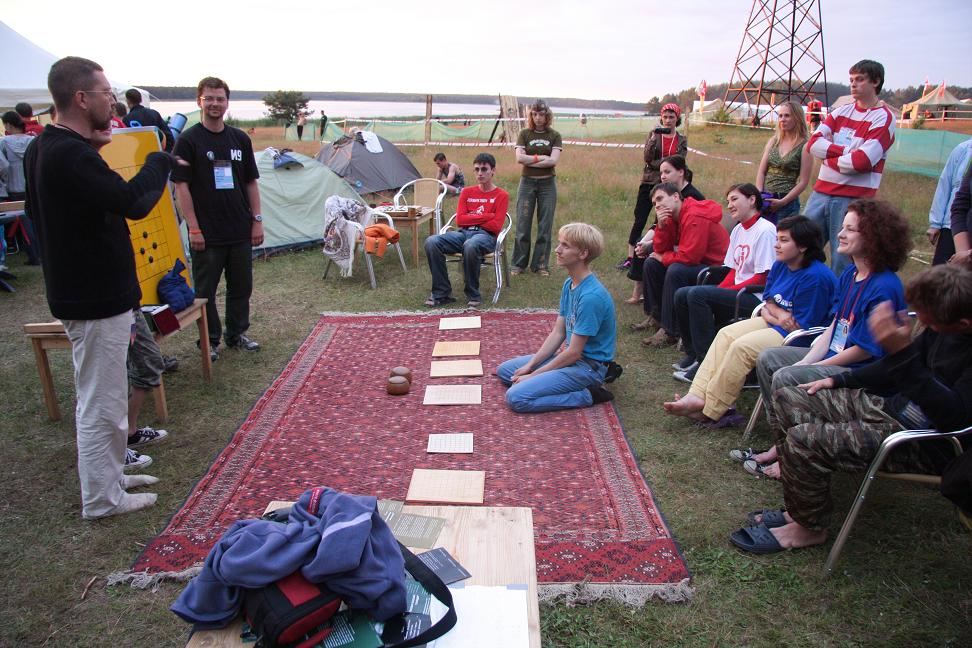
Go rules explanation by Igor Grishin and Dmitry Platonov.

Lake Seliger is a beautiful place.
Това не е просто бизнес-издание, това е книга за занимаващите се с бизнес. Бизнесът е война. А на война без бойна стратегия поражението е неминуемо. До тази книга руснаците знаеха за себе си, че могат да нанасят мощни удари. Деветте сталински удара са запомнени от целия свят. Но за да се спечели в съвременната война в бизнеса, само нанасянето на удари може да бъде недостатъчно . Тази книга Ви предлага едно много по-елегантно оръжие. Авторите го нарекоха “Девет изящни решения”.
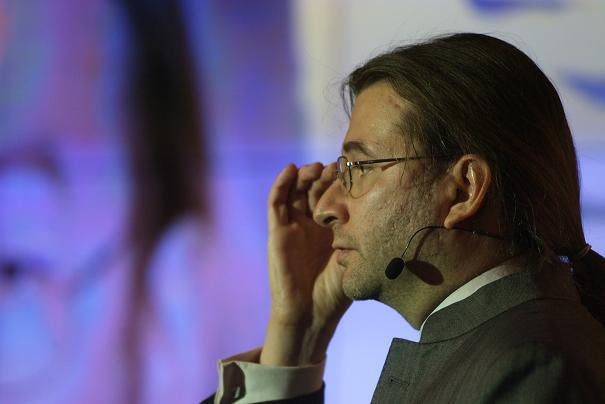
Efim Viktorovich Ostrovsky gives a lecture about strategy in Russia; Moscow, 2007.
**Question: Efim Viktorovich, how did you decide to establish a club?
E.V. Ostrovsky.** In Japan, where the Chinese martial art Weiqi is called Go, 1000 years ago it was forbidden to play it out of the imperial palace. If one did it they were beheaded. Next it was allowed to play Go only in four Houses. Why is it so interesting to remind about it? Because it shows us that Go is not much “a mass game” is the art of strategic planning which is intended for people who are co-scaled to this strategic planning. In the Ancient East they considered that common people did not need to play strategy as they would never use it. Nowadays Go is profaned like many other arts. Millions of people play it in China, for example.
In Russia this art has been known for a very long time but it is not very widespread. In Japan the officers of Self-Defense Force deem it duty to play Go. In Korea it is an activity for very wealthy people. In Thailand the royal family play Go. We founded a club in Russia to promote Go to upper class people. That is why our club is quite closed. All the members of it are very rich people.
We started building the club about 2,5 years ago. But we do not hurry. Now there are almost two dozens of people in the club. On the one hand, there are people who try to make up for lost time in the development of their strategic skills. On the other hand there are children. After joining the club you may bring your children but not your wife.
**Question. Why is it so?
E.V. Ostrovsky**. If you want your wife to be a member of the club she is to join herself. As for the children, one of our tasks is to train the new generation so that they could reach their life positions with absolutely other organization of consciousness.
**Question. Do you hold competitions among the club members or with other clubs?
E.V. Ostrovsky**. We have just received an invitation from South Korean colleagues who are holding a great tournament in Seoul where only businessmen take part in. It is going to be an amateur tournament. In this tournament there will be no professionals, sportsmen or occasional people. There will be businessmen from all over the world. Dozens of countries are invited. Perhaps, we will send there our team.
As for the tournaments inside the club, first of all we support the tournaments of the Go Federation. Secondly, we do a lot to develop the School. We have started series of qualification games based on the system of chin-san (A.D.: New Russian Ranking system, similar to kyu-dan). Last year we held an inner tournament in order to determine the strongest players.
But I must say that tournament sphere is not the main for us. It is a way to help each other to check ourselves from the point of view of those achievements that a person has reached during the past year or two.
**Question. Can you tell us what are the Russian positions at the world level, what can we aspire to?
E.V. Ostrovsky**. This question is missent. I think that the President of Go Federation Igor Alekseevich Grishin could answer it better than me.
I can only express my own opinion. Due to the fact that in the Far East Go and Weiqi are gradually being profaned and turned into sport, any civilized area, where they treat Go as a martial art, has greater chances to make the world breakthroughs. It is necessary to understand that Japan, China and Korea came through difficult set of transformations. After the American occupation Japan was doomed to imitate all western and American culture and inevitably fell into sports. In this sense Korea is similar to Japan by its fate. Though, Korea did not lose WWII. But this country was under a serious patronage. China had its own problem. Having sunk into communism, they had to build a myth about martial arts as about folk arts, though it has never been so. Martial arts have always been intended for aristocracy. It is obvious to anyone who is familiar with the subject or the history of the subject. Well, nevertheless, China has been in thrall to this paradigm of folk martial arts and is falling into sports as well.
In the twentieth century these very ancient cultures depreciated a set of cultural norms, samples and arts very important for their civilizations. Of course, Russia can open new horizons in this space. It is not as surprising as it may seem at the first sight. For example, I doubt that many people know the surname Malyavin. He is a great modern Russian Chinologist. In Taiwan and China they say about him: “this Russian man returns us our traditions”, he holds more traditions than the Chinese.
We should not forget that modern China is undergoing a cultural revolution with the deepest consequences, deeper than in USSR and today’s Russia. I would not warm to the subject “Russia is the motherland of elephants”. Though big hirsute elephants used to live in this territory, but it did not have the name of Russia. But I am not a supporter of some complexes of inferiority. The country is huge and it is situated between East and West and it is natural for Russia to “pick up” and “digest” both western and eastern cultural trends. We have been doing it for hundreds of years.
**Question. Do you have a favorite move on the board?
E.V. Ostrovsky**. Often we forget something that forms us as humans is not so much something what we like to do as something what we like to decline.
I never place a stone in the central point of the board (tengen) as it is an imperial, royal move. I never place a stone there if I am not absolutely sure that I will manage to win the game. Because if you move to a shan-point and lose, you are an impostor. And imposture is a horrible damnation. In spite of the fact that possibility or impossibility to place a stone into the center, the top of the board is not determined by rules. You ought to plan the game in such a way as it has not become necessary. It is important to understand that the board represents a mountain. The centre is a top, a point of a Master, a point of an Emperor. It is my favorite remark on the board.
**Question. Is it possible to define what a person is like according to the “handwriting” of a player?
E.V. Ostrovsky.** Of course, after a person has played a game with you he is transparent if you play head-to-head or he plays worse than you. If your opponent is much stronger than you, he can encipher his/her personality and herself/himself. The opponent can emulate different personalities on the board. Of course, you can see much on the board.
**Question. Can any moral or ethical considerations influence the result of a game?
E.V. Ostrovsky.** Moral is always conventional. Moral is following some common stereotypes. Game is a more ethical action. The art of Go is valued among aristocracy not so much on the board as outside of the board. The mission of a plane is not maneuvering on aircraft-carrier. In the same way the mission of this martial art is to find its use outside the board. Outside the board you are always restricted either by common moral or your own ethics.
A great deal on this board depends on what you think about yourself and your opponent. But this art appears not around victory or defeat. A real Master in this art, as they say among experts, is a Master over victory and over defeat. And I know people who think that the highest dignity is to win an edge in the game with a weaker opponent. It is very easy to collapse two or three groups of a weaker opponent and win with a disparity of a hundred stones. It is very hard to win with two or three stones (points) more as you can miscount by chance and lose.
**Question. Can the manner of the opponent’s playing influence further relationships between people?
E.V. Ostrovsky**. Yes, it can. I know such cases when, having played a few games with a subordinate, a boss understood that the employee was not suitable for the company, or vice versa. I know such cases, even from my own experience. Sometimes I changed my mind about a person after a game. It is like on tatami. If you meet a dweeb on a tatami it influences your attitude towards him/her.
**Question. A dweeb not physically but spiritually?
E.V. Ostrovsky.** Of course, especially if we take into consideration the fact that you do not need a great physical power on the board. The stones are not so large to require a special physical education. To a high degree any martial art is first of all training of spirit. Watching the game you can see how a person controls himself/herself. You can see who has more coherent and dense consciousness. For example, within the framework of my contracts with large corporations I hold some consulting sessions on the boards. I explained on the board how to build infrastructure, how to treat these or those strategic problems. As a result of these sessions several members joined the club.
**Question. At what moment of your life this game changed your attitude towards the surrounding world?
E.V. Ostrovsky.** It was very long ago, in my youth. I started playing Go in the beginning of the 80s. The whole youth I worked with several languages simultaneously. Besides, I took up semiotics, cryptography, different linguistic tasks. To my mind, these two cultures, semiotic-linguistic and culture of the martial art of Go, structured my consciousness in an absolutely nontrivial way for that cultural space where we exist.
Go teaches, first of all, nonlinear thinking. If you do not play Go I will never understand why Aristotle, who trained logic all his life, late in life decided to write topography. And you will not understand not because it is very complicated but because the surrounding world programs you on linear way of thinking. The whole culture, the whole civil structure of Russia and, speaking wider, European thinking program you as a linear logician. And if in youth you did not sink into quantum physics or Go you will never understand the late Aristotle. So you will not understand what European culture was pregnant with but has not been brought to bed up to now. You will not understand the difference between logical and topical way of thinking. In this sense a person who practices Go is in a sense the very Nietzsche’s superman. Not because he stars in a film “Superman” and has lots of muscles. Not because he speaks to everyone over the lip and looks down at everything. But because his/her consciousness is organized in a different way. While the consciousness of the majority is linear, linear-logical, he thinks multilinearly. For him/her scenario thinking is easier, it is inside him/her, especially, if s/he has been training it since his/her childhood. A person who does not just play via the Internet but studies with a teacher or with a high-qualified instructor, who has a teacher (i.e. with a student of a teacher), has a very high level of superiority.
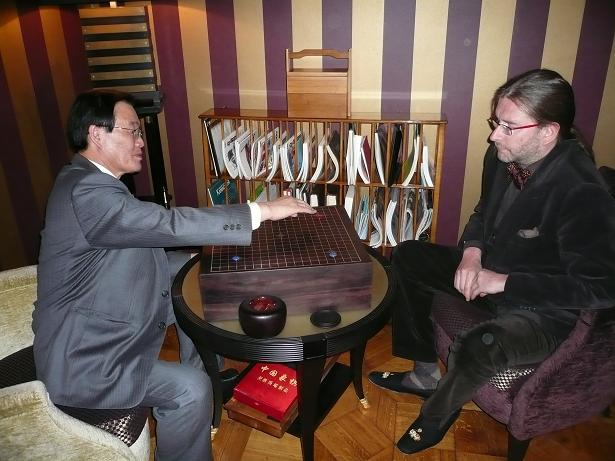
Mr. Poong Jho Chun 8p and Mr. Efim Ostrovsky playing in The Go&Strategy Club; Moscow, 2008.
**Question. What is required for the first dan in Go?
E.V. Ostrovsky.** You should play several games recording them, then a council of teachers admit as a collection of games for the black belt, for the first dan. Or you have to participate in a tournament, playing with first dans or higher, and play several games with some handicap given. But I am neither professional nor sportsman in this sphere. You should better spoke to Igor Alekseevich Grishin as he is a Chairman of the new qualification committee
**Question. What is esoteric part of the game?
E.V. Ostrovsky.** It is esoteric not because it is not spoken about but because it is very hard to speak about it. For example, I can tell you that on the board nine flying Feng-Shui stars are depicted. Do you understand? Or, for instance, if you know Taoist practices and deep, high Feng-Shui, you can show on the board its conceptions. Moreover, you can play collisions of the opponent’s streams. For, example, you can analyze wars and battles on it. You can really do it it is not a joke. You can analyze business strategies, or hold meetings on the board. It is reality. I know people who speak Go language. For example, they say: we will not open a branch office in France as, “look, there are lots of their stones, there is no point to play from power”. I just know these people, they are participants of the club and it is their lifestyle. By the way, they are a millionaire and a multimillionaire.
Besides, if you really master in interpretation you can point to absolute correspondence between the language of the game, the language of different forms on the board and the language of reality situations. High Master can educate a child at the board, show him/her how some combinations of stones reflect different not just communicative situations but, for example, his/her own reflections about himself/herself or his/her inner norms and rules. It is a wonderful, wonderful thing! Otherwise, I would not play it.
I used to play chess in my youth and almost achieved the first class (A.D: about 1-kyu grade, comparing to Go) but I did not find anything interesting in it and dropped it. But I have not dropped Go and I am even developing it. Now I am doing it within the frame of the club, interacting with federations, schools, international spheres. Among intellectual games it is, no doubt, an unexcelled game, except for bridge and mahjong. The third pole can be poker, which I used to like. But these are the games of another kind. These are the games with chance, with fate, with luck. But in this game the simplicity of the rules does not let one to blame a chance.
**Question. Should Go be an elitist art and should it popularize?
E.V. Ostrovsky.** I will answer in two ways as I do not understand what it means “should”?
**Question. In your opinion, what would be better?
E.V. Ostrovsky.** I do not like to teach others. I prefer to develop this art in the spheres where it is really necessary. On the other hand I understand that if we could organize a national campaign on advanced reproduction of Go-practice in wide strata of society, of course, it would modify common consciousness and a derivate from it – consciousness of individual personalities but in large numbers. But I understand that we need mass production of trainers and instructors. We need broadcast interventions in this space as, for example, they did in Japan. Pay attention to the fact that there Go existed for centuries in many-many generations. But in the 20th century they decided that this art needed support and produced a brilliant, wonderful, captivating even for a non-player, anime-series about a spirit of Master, a boy and a girl, who are drawn into this space. It is a very interesting series after which a number of resorts to Go practice or, how the Japanese say, Igo increased. But these are much scaled operations and the society in the club does not dare to raise their hands. That is why it is necessary for Go to develop some area of establishment.
Besides, I understand … It is the second answer. I understand that when you start popularize any high practice, you should be ready to the loss of quality, as, undoubtedly, these are two different tasks: to produce ten perfect samples or to produce ten million perfect samples. They are perfect in different ways and exceed different things. I am a person who strives for producing of ten samples, rather than to producing of ten million samples. All my life I worked with little series. Even starting activities that usually require mass markets I always find such niches where I can work for limited markets of a very high level though. So I see two thousand Igo or Weiqi players in the country. From two hundred to two thousand players from upper class, from establishment in the country. If this art is practiced, I think, it will cause cultural shift. First of all it will cause shift in strategy planning and shift in techniques of domination. In this sense it will lead to shift in the structure of authority and politics. There will be more art, more strategy, and more poetry if you prefer. But, I shall repeat, in this sense I am not against mass production, I just see risks and I am very careful on this subject and prefer to do everything step by step like on the board.
**Question. Is this lesson from the game as well?
E.V. Ostrovsky**. Yes, of course. Until you have disposed your forces on the fourth line you cannot go higher. The game starts from placing of several stones on this line or on two-three lines below it. Until they are relocated between two partners nobody can go to the fifth line or higher. First edges and then the centre. First preparing, preparatory disposition and then the operations. First the question of preparation and then the question of victory and defeat.
**Question. So it is possible to foresee the further tactics of the opponent?
E.V. Ostrovsky.** There are three stages of a duel. Of course, nobody does what refers to the third stage in the first one. There are Japanese words that characterize them. But I do not think that it is interesting for our readers; who cares how the Japanese name it. In the Russian language they are sometimes called commitment (sovershenije), completion (zavershenije) and fulfillment (ispolnenije). Notice that commitment is the first stage, and then comes completion – moving to the top – and then comes the third stage – fulfillment. It may seem that an ordinary person thinks that everything should be vice versa, linearly. But it is not so. If you take away any part of the game you will see this wonderful nonlinearity. Several men from President Medvedev’s administration visit us. One of them looked at the game for the first time, thought and said that it was impossible to play this game without broadening consciousness. People catch everything at once if they catch. In our world there are lots of people who will never catch anything, neither at once nor later. It is not news.
**Question. What can we learn from the first lesson? Is it possibly to learn anything?
E.V. Ostrovsky.** It depends on a teacher. If you are taught by a great Master you learn much new after every lesson.
**Question. Can the game change a person?
E.V. Ostrovsky**. Yes, But it will not transform you from a caterpillar into a butterfly. If you want to change with the help of Go you can change. But it is impossible to guarantee that the game will change you. If you do not change yourself it will not “plough you up”. But if you work carefully on the board and at the board and try not as much to study how to win as how to reform yourself Go will certainly help you. It is a very simple language, which can be used to describe different and even very complex conceptions. This is its peculiarity.
Questions: Russian TV channel O2TV
The text is prepared by Irina Chukomina, translated by Elena Myasnikova

uebersetzt von Markus Krupp
“The Martial Art of Strategy. Russian Style. 9 Elegant Solutions” is now in Japanese.
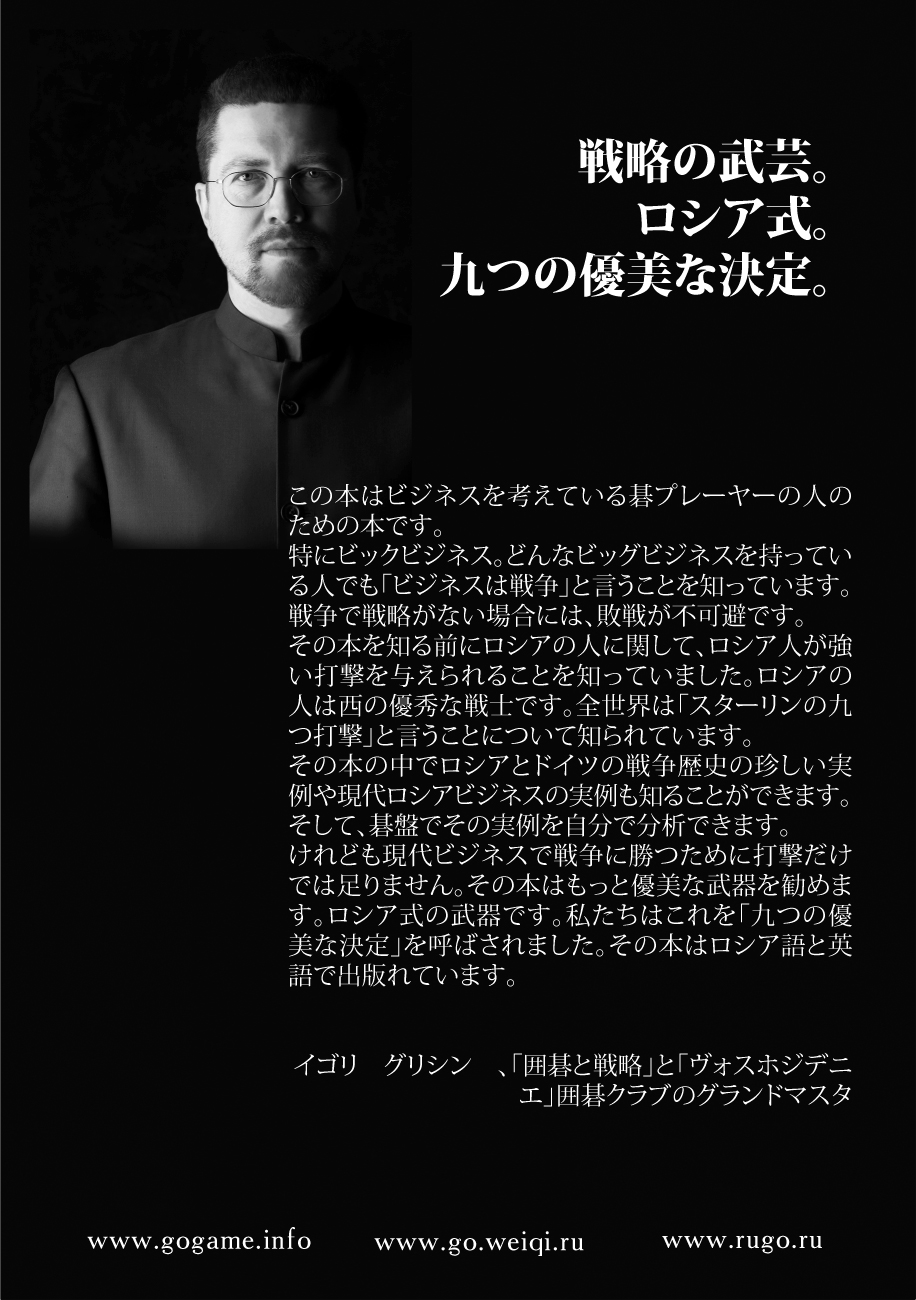
translated by Anastasiya Povaliyukhina